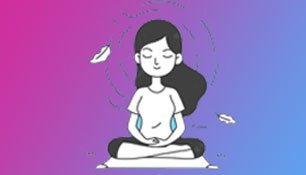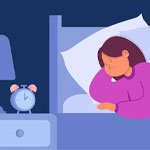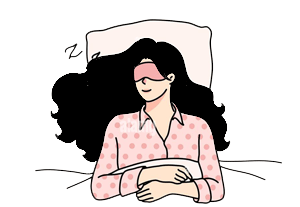If you’ve experienced difficulty sleeping well, you’re aware that it could be highly detrimental to your mental and physical well-being. It doesn’t matter if your racing thoughts keep you awake or if you see signs of a health issue. You’ll need to find a solution for sleep that is effective for you.
We’re here for you! Please look at our latest tips below for tips on what to do when you’re struggling to sleep.
Table of contents
Why can’t I sleep All Night, Even When I’m tired?
Certain stages of life (students, pregnant mothers, students, new parents, and night shift employees) tend to be affected by sleep schedules that are not as regular. But for those who are frequently experiencing sleeplessness even when tired, there are three significant elements to be considered: mental health, physical health, and nutrition.
Mental Health

Find counseling and therapy with an accredited professional to understand how to take care of your sleep and mental health. A virtual or in-person session with an experienced psychologist can assist you in working through any mental obstacles or stressors affecting your sleep quality. If you require specific treatment for diagnosed mental health issues, sleep disorders, or sleep disorders, a psychiatrist can provide talks and prescriptions.
Physical Health
Insistently experiencing poor-quality sleep adversely affects your physical well-being. In turn, your physical health is also a factor in your sleep quality.
Here are a few ways your health and fitness can affect your sleep quality:
- Age: Although aging may not be the sole reason for sleep disruption, there is a significant change in the sleep patterns of older adults. The reason for this could be changing circadian rhythms, an increasing number of medications, and the appearance of some sleep disorders such as sleep apnea as well as Restless Leg Syndrome (RLS).
- Hormones Certain life phases, such as menopausal or puberty, could negatively affect sleep because hormone levels fluctuate before they stabilize.
- The pain If it’s arthritis in your back, neck or hips, chronic and acute pain can make it difficult to relax and sleep.
- Medication It’s normal for many prescription and prescription drugs to cause inevitable adverse consequences. Examine your medication to determine whether your medications can cause insomnia, difficulty sleeping, and racing thoughts. If they do, you may be able to switch to another medication with your doctor’s permission.
If you believe that your physical health is affecting your sleep, you should schedule an appointment with your primary healthcare provider to determine which next steps will be most beneficial for you.
Nutrition
Diet is the human body’s primary energy source, and it is only natural that there are direct connections between diet and sleep. Consuming a balanced diet helps maintain energy levels for a long time, which helps improve brain function, the growth of muscles, intestinal health, and sleep quality.
Although it’s OK to indulge in desserts that are sweet or savory but overindulging in alcohol, caffeine as well as sweetened drinks and sugary food items can affect your sleep. Start by limiting or eliminating these foods, and do not eat for three hours before bedtime to allow optimal digestion and control.
What Should You Do If You’re Not Sleepy?

Here are some additional efficient methods to help in overcoming sleeplessness.
Create a Relaxing Environment
Sometimes, all you need for a beautiful sleep is to make sure you have a perfect sleeping environment. Are you wondering why spas have dim lighting and soothing music? These elements make clients feel relaxed and calm after their visit, leaving them with lower cortisol levels and an increase in serotonin and oxytocin levels.
Get the spa into your home by following these helpful tips.
Set the Thermostat

To maintain a consistent temperature in your bedroom, make sure that your blinds are shut throughout the day (especially during summer) or set an air conditioner at a medium or low setting to help circulate air. Keep in mind that the more steps used to keep the temperature constant more work your body needs to perform to control your body’s temperature during the night!
Put your money into Comfortable Sleepwear.
For those who prefer to sleep naked, There are sleepwear and loungewear options for everyone’s age, budget and personal style.
When you’re trying to find the perfect Sleepwear, it is essential to take into consideration the fit, feel, as well as breathability. If your clothes are too tight or loose, your body’s motion is restricted. If your clothing is too soft or rough, you’ll not feel at ease in any position. When you wear clothes that are thick in fabric, you can overheat your body.
Play relaxing music or listen to a relaxing Meditation.
The range of music from Beethoven or white noise to Beethoven, there’s something there for every person. When listening to music before bed, a study in 2019 discovered that music recorded at 432Hz could provide significant calming effects.
If you’re not a fan of listening to music in the evening, however, you may prefer other audio outputs; consider relaxing meditation, the ASMR, or a guided breathing session. With playlists via YouTube, Spotify, and the best sleep apps at your fingertips, you can see which is the best for you!
Try an eye Mask

There are many choices if you are a consumer looking for masks for their eyes to use for other purposes like travel, headache, migraine control, or even aesthetic reasons. Check out our list of the most effective sleep masks that are available!
Explore the possibilities of Aromatherapy.
Although some people think that the use of Aromatherapy to sleep is a costly gimmick, Numerous studies have confirmed its benefits for health, connecting certain fragrances to relaxation. Some of the most beneficial scents to help you sleep sleeping include:
- Cedarwood
- Lavender
- Roman Chamomile and
- Vanilla
Combine aromatics with a diffuser or humidifier to see which combination is the most relaxing for you! But, ensure you adhere to the guidelines for essential oils and ensure that your humidifier’s compatible with Aromatherapy.
Limit Blue Light Usage

Although it can be challenging to quit the habit, set an objective of restricting screen time to up to three hours before going to bed so that your body has enough time to become tired and aid in falling asleep. It is also recommended to turn your devices in silent mode so that the pings from social media won’t wake you during the time of night.
Get an ice-cold bath or shower.
Did you realize that taking a hot bath or shower 90 minutes before bed could improve your sleep quality? Balancing body temperature to relaxing tight muscles and washing off or taking a long soak before bed has many benefits.
Do you want to take your night bath experience to the highest level? Combine it with bath salts, Aromatherapy, and soothing music to increase your serotonin levels.
Exercise to Stretch, Practice, or Exercise Yoga
It’s difficult to relax with tight muscles or muscles that are tense. If you end your day with nervous tension or energy, moderate exercise for up 30 minutes before going to bed will help reduce cortisol levels and help you get relaxed and ready for bed.
Do you want to cleanse your body of extra energy without breaking too much sweat? Stretching and yoga are effective workouts that reduce the heart rate, ease your body, and aid in preparing for your bed.
Test a New Comfortable mattress or Mattress Topper.
If you’re exhausted or not, it’s an issue to get to sleep on a hard and uncomfortable mattress. If your body’s not supported correctly, you can expect to turn and toss during the night.
Do you want that warm sensation but aren’t ready to purchase an entirely new mattress yet? If you’re experiencing discomfort and your mattress keeps you awake at night, you might be interested in our most recent review of the best mattresses. We’ve also compiled an inventory of the most comfortable mattress covers, allowing you to sleep more comfortably in the evening.
Pay Attention To Your Body
In the end, the body will tell you when it’s time to sleep. Doing your best to stay awake when you’re tired might be unnatural.
Instead, get up from bed and go to a different place for 30 minutes (read your book, wash the dishes, and play with your dog) until you’re exhausted. In the meantime, you’ll help your brain recognize the bedroom as a space for rest, not as a multi-purpose room.
FAQs
Why can’t I sleep in a quiet room?
Being at home alone in the evening can trigger various feelings, including depression, anxiety, loneliness and much more. To counter this, try sleeping on a weighted blanket, finding an activity you enjoy in the daytime, and extending your social activities.
Why can’t I rest while I’m pregnant?
The body experiences a variety of changes during pregnancy. It all depends on the trimester you’re in, and typical insomnia-causing factors include morning sickness, frequent urination, leg cramps, stomach cramps, hip and back discomfort, and insomnia during pregnancy. Please read our article on how to sleep the best throughout (and after) the pregnancy!
How can I get my sleep while I’m sick?
The body is hyper-drive when you feel unwell, fighting off viral or bacterial illnesses. Particularly when you’re suffering from high fever, sinus pressure or respiratory problems, It can be challenging to take the time your body requires to heal quickly. Please look at our guide for how to rest during illness to discover the remedies that can help you!
